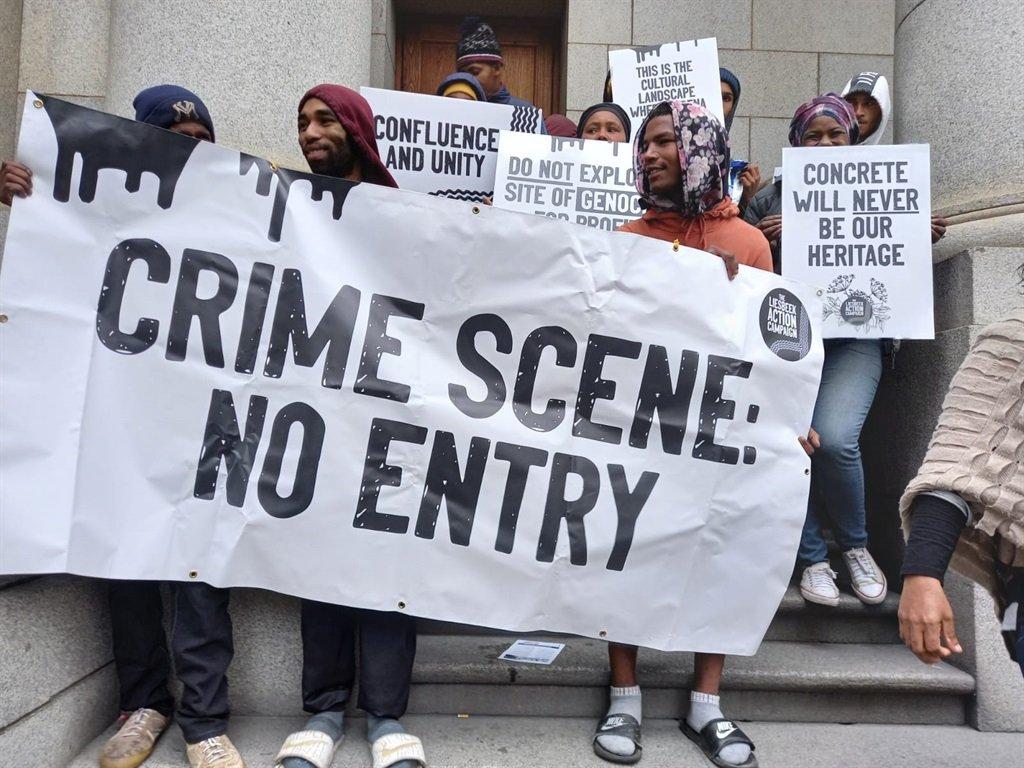Africa-Press – South-Africa. A faction of the First Nations people made a desperate bid on Friday to get the Western Cape High Court to stop the construction of Amazon’s new headquarters in Cape Town until there was further consultation over site’s heritage value and a review of the permissions granted.
“The more established they will become in their position, the less likely the reviewing court is going to say, ‘Tear it down’,” argued advocate Peter Hathorn, acting for a grouping opposed to the development.
In March, Deputy Judge President Patricia Goliath granted an interim interdict to the Ghoringhaicona Khoi Khoin Indigenous Traditional Council (GKKITC) and the Observatory Civic Association (OCA) that developers Liesbeek Leisure Property Trust (LLPT), stopping building on the River Club site.
The construction company said they lost R22 million just in one month of halting construction after the order was granted, so set in motion an application for leave to appeal. The company felt that because they had lodged their intention to appeal, the order was suspended and they could carry on building in the meantime.
They restarted in June, after a period of doing low-key maintenance, and on Friday insisted that they were not building beyond the rising building seen from the highway.
The matter was becoming bogged down in lawfare, which Hathorn argued gave developers time for more construction.
Amazon is going to walk, lawyer warns over River Club development
The GKKTIC applied for an application to state that LLPT was in contempt of court by going against Goliath’s order, but there were delays and postponements.
There was a surprise bid to ask the court to decide who the true representatives of the Khoi and San were in this matter. Friday’s application was for interim relief to force a stop to construction, pending the hearing of the contempt application by those opposed to the development.
The GKKITC argue that the development would destroy the site that is sacred to First Nations people. However, there was a dispute over who the true representatives of the Khoi and the San were and which faction of the GKKITC the court should listen to.
At a previous application lawyers for the opposing sides stood up to say they were the true legal representatives for the true First Nations people.
A group called the Western Cape First Nations Collective (WCFNC) within the GKKITC alleged that Tauriq Jenkins, who was driving opposition to the development, did not have a mandate to represent them.
They alleged that he was also not a leader of the GKKITC as claimed and insinuated that he wheedled his way into the GKKITC. This grouping felt that the construction was a new form of colonialism.
The WCFNC agreed that the site had cultural heritage value but felt that this did not trump the job opportunities that were really needed in Cape Town. They felt the development, which includes a mixed use residential section, gave them hope of finding employment.
They were happy with the compromise of building a heritage museum and a medicinal garden at the Amazon campus.
However, in this case, Hathorn said the leave to appeal or the review had not been heard yet and the builders would build themselves into a position where the court found it pointless to find against them.
“They were aware of the review application, and they carried on construction at their own risk,” said Hathorn.
OPINION |
River Club development: LLPT cannot buy the truth even though they continue to try
The LLPT’s lawyer, Sean Rosenberg SC, argued that while all of the court cases were being sorted out, no work was going to be done in the intervening period outside the construction wall of the buildings being constructed.
He said there were two precincts and the work at the moment was taking place in Precinct 2 A in buildings that would house Amazon’s web services on about 90 000 square metres. Precinct 1, the mixed use residential area, would take up 60 000 square metres and was not scheduled to start building yet. A third precinct would be open land.
He said the “bogey” that developers would build themselves into an impregnable position could not be supported.
He said the area previously had a golf course, asphalt parking, and was degraded, so there was “nothing to preserve”. Nevertheless it would be possible to memorialise heritage and there would be no irreparable harm.
Rosenberg warned that if the development was paused, or failed, the LLPT faced severe financial penalties to the financier RMB, the contractor, Amazon and crews.
“A month’s pause will have very significant financial consequences. That tips the balance of convenience decisively in favour of the trust,” he argued.
Construction was expected to be completed by November 2023, and handover date was set for December 2023.
The application continues.
For More News And Analysis About South-Africa Follow Africa-Press






